2021 Ekadashi Day: Date, Times, Significance, Types and Eerything to Know
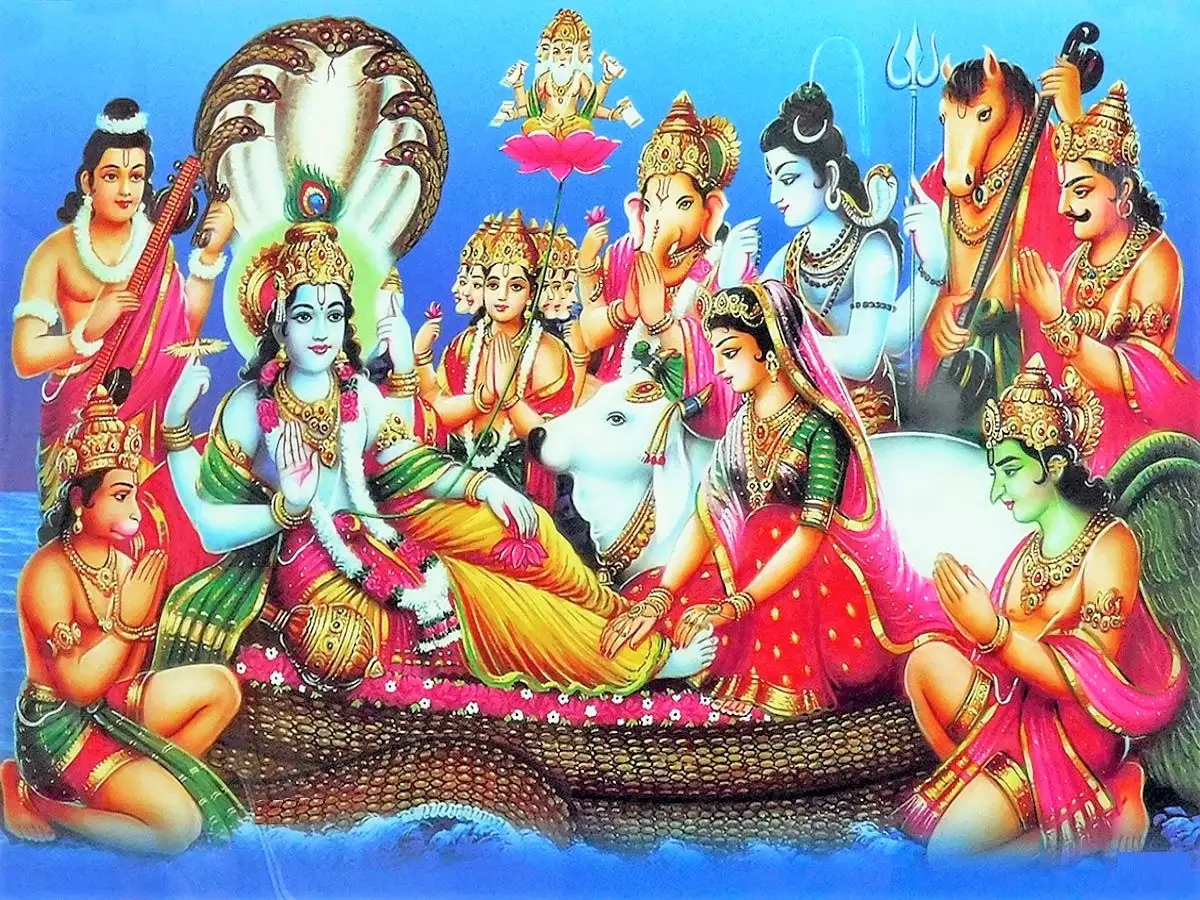 |
| Photo: Timesofindia |
What is Ekadashi?
As per the Hindu calendar, the eleventh day of the lunar fortnight is called Ekadashi. On this day devotees of Lord Vishnu keep a day-long fast to seek his blessings and attain Moksha (liberation from the cycle of birth, death, and rebirth).
Usually, there are two Ekadashis in one month, comprising one at the time of Krishna Paksha (the waning phase of the Moon) and the second at the time of Shukla Paksha (the waxing phase of the moon). Therefore at a total of 24 Ekadashis take place in a complete year. However, the number increases to 26 when the Adhik Maas gets added to the calendar once in about 32 months. Interestingly, each Ekadashi has a specific name and significance.
On the day of Ekadashi, devotees keep a strict fast and break their fast on Prana. Parana means breaking the fast. Ekadashi Parana is done after sunrise on the next day of Ekadashi fast. As per drikpanchang.com, "One should do Parana within Dwadashi Tithi unless Dwadashi is over before sunrise. And not doing Parana within Dwadashi is similar to an offence."
Significance of Ekadashi
This cycle in the system is something that most people can identify if they take away the nonsense of “so many calories, so much protein and so much mineral should be eaten.” If they listen to the body, these three days can be easily identified by most human beings. So it was told that three times in those 48 days, you should not eat. This was said because somebody observed his own system and from that he expressed this. But then people did not have the awareness so they fixed the Ekadashi for not eating. If you look, there are three Ekadashis in 48 days. It goes well.
Ekadashi Fasting
The reason is that the planet itself is in a certain state on that day, so if we keep our body light and available, our awareness will turn inward. The possibility of opening the door within is more on that day. If you have a full stomach, and you are unaware and dull, you will not notice it. So to stay alert and also to purify the body, you go without food on that day – you ate dinner the previous day and the next thing you eat is dinner on Ekadashi.
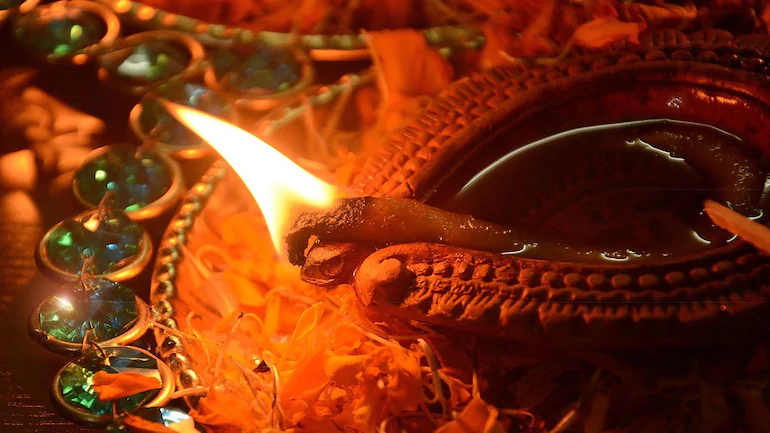 |
| Photo: Indiatoday |
Why is the rice not eaten on Ekadashi?
According to religious beliefs, a drop of sweat fell on the ground from Lord Brahma’s head and became a demon. When it asked for a place to live, Brahma told the demon to exist in the grains of rice consumed by people on Ekadashi and convert into worms in their stomach. There is also a scientific reason behind not having rice on Ekadashi. Eating food that retains too much water on Ekadashi can cause unsteadiness as the moon attracts water and the rays of the moon are said to have more cosmic energy on this day. Since rice grains hold a lot of water content, consuming it can lead to the aggravation of certain conditions like water retention, cold, sinusitis etc.
Types of Ekadashi
Putrada Ekadashi
Putrada Ekadashi takes place in January on the eleventh day of the bright half of the lunar cycle. It translates to ‘giver of sons’ and fasting on the day combined with offering puja to Lord Vishnu can bless the believer with children. Devotees start the fast from the dawn of Ekadashi and end it the next morning. They are not allowed to eat rice, pulses, garlic and onion during the fast. People who can’t follow the strict fasting rules can have milk and fruits. Non-vegetarian foods are strictly prohibited in Hindu households on this day.
Satilla Ekadashi
Satilla or Tilda Ekadashi is stemmed from the word ‘Til’ which means sesame seeds. This Ekadashi involves giving and receiving sesame seeds as gifts and making food that includes them. People who fast on this day should donate sesame seeds, cereals and other foods to strengthen their fate. The story of this day highlights the importance of ‘annadaana’ or food donation in Hindu culture. Devotees should not eat pulses, grains or beans in meals and fruits like coconut, guava and pumpkin should be offered to the deity.
Jaya Ekadashi
On this auspicious day, people observe a fast starting from the timings of the Jaya Ekadashi to the next morning. Sticking to the basic rule, non-vegetarian food is not allowed. Devotees must not eat pulses and rice, but eating on this day is not completely prohibited. They can eat fast recipes like aloo jeera, sabudana khichdi, sabudana kheer, kattu ki poori or paratha etc. Consumption of milk and fruits is also allowed. Having honey, leafy vegetables and some particular spices are not considered auspicious.
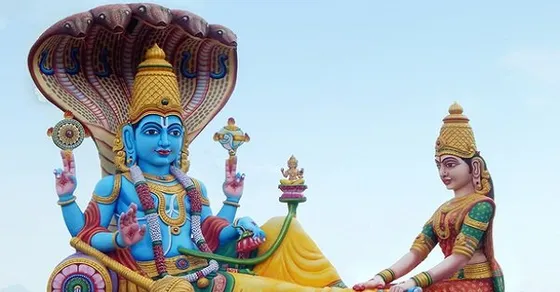 |
| Photo: Timesnow |
Vijaya Ekadashi
Traditionally, a full day fast is observed on Vijaya Ekadashi and the devotees spend the day worshipping Lord Vishnu, who is believed to sustain the Earth. They cannot eat Tamasic foods made with onion and garlic. They are also not allowed to have grains such as rice, lentils and pulses. Sabudana khichdi with ground nuts and potatoes is a preferred food during Vijaya Ekadashi. However, it should only be seasoned with rock salt and not have many spices. Milk and dry fruits can also be consumed.
Amalaki Ekadashi
Amalaki Ekadashi also celebrates the greatness of Lord Vishnu. Amalaki means Amla, which has a very important place in both Ayurveda and Hinduism. According to Padma Puran, Amla was very dear to Lord Vishnu and the day is thus commemorated by making amla paste, worshipping amla tree, consuming and even donating amla. It is also offered to the lord as Prasada. Grains and legumes are not eaten during the fast and only potatoes, nuts, milk, fruits, black pepper and rock salt are allowed.
Amalaki Ekadashi
Amalaki Ekadashi also celebrates the greatness of Lord Vishnu. Amalaki means Amla, which has a very important place in both Ayurveda and Hinduism. According to Padma Puran, Amla was very dear to Lord Vishnu and the day is thus commemorated by making amla paste, worshipping amla tree, consuming and even donating amla. It is also offered to the lord as Prasada. Grains and legumes are not eaten during the fast and only potatoes, nuts, milk, fruits, black pepper and rock salt are allowed.
Kamada Ekadashi
Kamada Ekadashi occurs at the beginning of the ‘Hindi New Year’ and observing a fast on this day is said to protect the devotees from many kinds of curses. Special bhog should be offered to Lord Vishnu while praying on Ekadashi and devotees should not consume meals on this day. If they must eat, the food should be completely sattvic. Dry fruits, fruits and milk products are allowed. The fast should be ended the next day after offering food to the needy. Consumption of beans, peas, pulses and grains are prohibited. It is said that Tulsi leaves should also not be plucked or consumed on this day.
Varuthini Ekadashi
Observing a fast on Varuthini Ekadashi is considered to be equal to being in penance for ten thousand years. The fast begins on the dawn of Ekadashi and continues to the morning of the next day. After offering puja and Prashad and donating food to brahmans, They can break the fast. If they can’t do a total fast, they can have one meal in the day but avoid red lentil, black gram, chickpeas, honey, betel nut leaves, betel nuts or spinach. They can have sabudana, milk, water, fruits and sweets.
 |
| Photo: Indiatoday |
Varuthini Ekadashi
Observing a fast on Varuthini Ekadashi is considered to be equal to being in penance for ten thousand years. The fast begins on the dawn of Ekadashi and continues to the morning of the next day. After offering puja and Prashad and donating food to brahmans, They can break the fast. If they can’t do a total fast, they can have one meal in the day but avoid red lentil, black gram, chickpeas, honey, betel nut leaves, betel nuts or spinach. They can have sabudana, milk, water, fruits and sweets.
Apara Ekadashi
During worshipping the lord on Apara Ekadashi, it is important to offer bhog and tulsi leaves. Also, They must donate food and clothes to the needy. Share the prasad with everyone in the family. Food items like rice, meats, onion, garlic, lentils are strictly forbidden on this day. The fast must be broken on the next day only during the Puran muhurta. They can have milk-based foods, dry fruits, fruits and vegetables (if they can’t observe a full fast) only.
Nirjala Ekadashi
Nirjala translates to ‘without water’. The fast on this Ekadashi is observed for 24 hours without drinking water starting from the sunrise of the Ekadashi to the next morning. One evening before this Ekadashi, the people who do the fast offer a prayer and then eat just once in the day. The meal does not contain rice and lentils as they are prohibited. They are allowed to have a small drop of water following the purification ritual. During worship, panchamrit or a mixture of milk, ghee, curd, sugar and honey is offered to the deity.
Yogini Ekadashi
Yogini Ekadashi entails eating food that is devoid of any salt. The devotee should not eat any stimulating food from one night before the Ekadashi and are suggested to eat saltless food. Barley, moong dal and wheat are prohibited food items on the day before as well as on the day of the fast. A devotee can only break their fast after donating food and clothes to brahmans and the needy the next morning.
Padma/Devashyani Ekadashi
On this pious day, the devotees perform the Ekadashi fast and use of grams and lentils, honey, certain spices and all meats are strictly forbidden. They can also not have any Tamasic food made with roots like garlic and onion. They can break the fast the next morning after offering milk, honey, sugar and flour. This day marks the beginning of chaturmas, which are holy four months in the Hindu calendar and auspicious works are not carried out during this time.
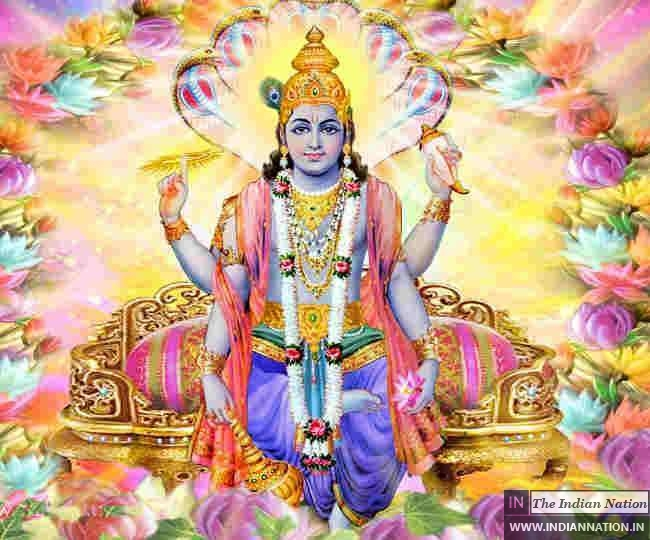 |
| Photo: Indiannation |
Kamika Ekadashi
This Ekadashi is celebrated within the chaturmas period when Lord Vishnu is believed to be sleeping. On this day, the devotees must offer milk, fruits and sesame seeds apart from flowers to the lord while worshipping. They must also offer the panchamrit. It is considered best practice to fast the entire day and eat only after distributing food to the poor the next morning. If they eat one meal, they must ensure to skip rice and meat. Donating fresh buds from the Tulsi plant also has a special significance on this day.
Aja Ekadashi
Observing a fast on Aja Ekadashi destroys our sins and ignorance. It is important to worship the lord with grains and coriander leaves or seeds. Eating grams, gram seeds, honey or vegetables like karonda (Carunda) is not allowed. They must only consume food once and not have a second meal on this day. Masoor dal should not be eaten one night prior to the fast. Also, devotees should refrain from eating betel leaves (paan) on Dashami.
Parivartini, Vamana or Parsva Ekadashi
On Parsva Ekadashi, fasting and praying to Lord Vishnu purifies the devotees of all sins and pleases Goddess Lakshmi. If they want to fast on this day, they must not consume food after sunset on Dashami. They have to worship the Lord with sesame seeds, seasonal fruits and Tulsi leaves. They must not have a regular meal on this day but can have fruits, dairy products and dry fruits after offering the evening prayer. They should avoid eating rice, grains and beans on this day.
Indira Ekadashi
On Indira Ekadashi, fast is observed to provide salvation to forefathers. Lord Shaligram is worshipped on this day. Devotees must not consume food more than once starting from one evening before Ekadashi. They can only break their fast on Dashami after the tarpan ceremony and once the food is offered to the brahmans. On Ekadashi, they must fast for the entire day devoid of grains and cereals, then donate food to the brahmans and then to a crow, a cow and a dog. The fast is only broken on Dwadashi after offering puja and sharing meals with the family.
Padmini Ekadashi
Fasting is an integral part of Padmini Ekadashi to purify the mind, soul and body. The observer can’t eat food items like rice, chickpeas, spinach, honey and urad dal. The devotees who cannot hold a strict fast can have a meal made up of fruits and dairy products. Fast begins on Dashami and the devotee must have light food without onion, garlic and strong spices. Eating in bronze utensils is prohibited.
Parama Ekadashi
Doing fast on this Ekadashi rids a devotee of all sins and they attain the realms of gods. Only sattvic foods consisting of fruits, sweets and dairy are allowed to be eaten on this day. This option is for those who cannot go through the entire day without having a meal. Devotees keep 24 hours fast and survive only on water. They should not eat foods such as lentils, grams, honey, meats and vegetables.
Papankusha Ekadashi
On Papankusha Ekadashi, devotees must start the fast from the day of Dashami like other Ekadashis. They must not consume rice, barley, wheat, gram, moong and urad dal on Dashami as these seven grains are considered pious and worshipped on this day. Foods that are heavy on digestion such as sabudana, chips, bananas or fried items are prohibited. Drinks like water, fruit juice and milk are allowed. The fast can be broken only on Dwadashi after serving food to the brahmans.
Rama Ekadashi
People who can’t keep fast on Rama Ekadashi must ensure not to consume dishes made of rice or any nonvegetarian food. Those who observe the fast must abstain from eating at all on this day. However, if that is not possible they may only have vegetarian and organic foods. Devotees must apply turmeric to basil leaves and offer to the lord while performing puja.
Devathuna Ekadashi
It is believed that on this day, Lord Vishnu wakes up from four months of rest. From this Ekadashi onwards, devotees are free to carry on with their auspicious activities that are prohibited in this period. Food is consumed in the noon of Dashami and then devotees can only have a meal on the next morning after Ekadashi. This is important so that not even a residue of food remains in the body on the fasting day. Some people do not eat at all or drink water but others follow a milder fast by consuming fruits, milk, natural fruit juices and tea. The people doing a fast must not eat grains, vegetables and cereals on this day.
Utapanna Ekadashi
According to religious beliefs, people who fast on Utapanna Ekadashi find all kinds of comforts and receive the shelter of Lord Vishnu after death. Devotees who have the body strength and willpower should observe a strict fast, sipping only water through the day. Those who can't perform the fast should not eat prohibited food items such as garlic, alcohol, meat, masoor dal etc. Special significance is given to inviting married women and offering them fruits. Kheer with tulsi leaves is also prepared on this day.
Mokshada Ekadashi
Like other Ekadashis, Mokshada Ekadashi is also marked by a fast stretching from the break of the day to the next morning. A strict fast is observed and eating anything is not allowed. Other people observe partial fasts where they consume fruit juices, dry fruits, milk and fruits. Those who can't keep the fast but want to honour the lord abstain from onion, garlic, pulses, beans, rice etc. and stick to fruits, vegetables, milk products and nuts. Bel tree leaves are consumed on this day.
 |
| Photo: Pratyangirasiddhi |
Ekadashi 2021 dates and timings
January 9, 2021 (Saturday): Saphala Ekadashi
- Pausha, Krishna Ekadashi
- Begins: 21:40 on Jan 08
- Ends: 19:17 on Jan 09
January 24, 2021 (Sunday): Pausha Putrada Ekadashi
- Pausha, Shukla Ekadashi
- Begins: 20:56 on Jan 23
- Ends: 22:57 on Jan 24
February 7, 2021 (Sunday): Shattila Ekadashi
- Magha, Krishna Ekadashi
- Begins: 06:26 on Feb 07
- Ends: 04:47 on Feb 08
February 23, 2021 (Tuesday): Jaya Ekadashi
- Magha, Shukla Ekadashi
- Begins: 17:16 on Feb 22
- Ends: 18:05 on Feb 23
March 9, 2021 (Tuesday): Vijaya Ekadashi
- Phalguna, Krishna Ekadashi
- Begins: 15:44 on Mar 08
- Ends: 15:02 on Mar 09
March 25, 2021 (Thursday): Amalaki Ekadashi
- Phalguna, Shukla Ekadashi
- Begins: 10:23 on Mar 24
- Ends: 09:47 on Mar 25
April 7, 2021 (Wednesday): Papmochani Ekadashi
- Chaitra, Krishna Ekadashi
- Begins: 02:09 on Apr 07
- Ends: 02:28 on Apr 08
April 23, 2021 (Friday): Kamada Ekadashi
- Chaitra, Shukla Ekadashi
- Begins: 23:35 on Apr 22
- Ends: 21:47 on Apr 23
May 7, 2021 (Friday): Varuthini Ekadashi
- Vaishakha, Krishna Ekadashi
- Begins: 14:10 on May 06
- Ends: 15:32 on May 07
May 22, 2021 (Saturday): Mohini Ekadashi
- Vaishakha, Shukla Ekadashi
- Begins: 09:15 on May 22
- Ends: 06:42 on May 23
June 6, 2021 (Sunday): Apara Ekadashi
- Jyeshtha, Krishna Ekadashi
- Begins: 04:07 on Jun 05
- Ends: 06:19 on Jun 06
June 21, 2021 (Monday): Nirjala Ekadashi
- Jyeshtha, Shukla Ekadashi
- Begin: 16:21 on Jun 20
- Ends: 13:31 on Jun 21
July 5, 2021 (Monday): Yogini Ekadashi
- Ashadha, Krishna Ekadashi
- Begins: 19:55 on Jul 04
- Ends: 22:30 on Jul 05
July 20, 2021 (Tuesday): Devshayani Ekadashi
- Ashadha, Shukla Ekadashi
- Begins: 21:59 on Jul 19
- Ends: 19:17 on Jul 20
August 4, 2021 (Wednesday): Kamika Ekadashi
- Shravana, Krishna Ekadashi
- Begins: 12:59 on Aug 03
- Ends: 15:17 on Aug 04
August 18, 2021 (Wednesday): Shravana Putrada Ekadashi
- Shravana, Shukla Ekadashi
- Begins: 03:20 on Aug 18
- Ends: 01:05 on Aug 19
September 3, 2021 (Friday): Aja Ekadashi
- Bhadrapada, Krishna Ekadashi
- Begins: 06:21 on Sep 02
- Ends: 07:44 on Sep 03
September 17, 2021 (Friday): Parsva Ekadashi
- Bhadrapada, Shukla Ekadashi
- Begins: 09:36 on Sep 16
- Ends: 08:07 on Sep 17
October 2, 2021 (Saturday): Indira Ekadashi
- Ashwina, Krishna Ekadashi
- Begins: 23:03 on Oct 01
- Ends: 23:10 on Oct 02
October 16, 2021 (Saturday): Papankusha Ekadashi
- Ashwina, Shukla Ekadashi
- Begins: 18:02 on Oct 15
- Ends: 17:37 on Oct 16
November 1, 2021 (Monday): Rama Ekadashi
- Kartika, Krishna Ekadashi
- Begins: 14:27 on Oct 31
- Ends: 13:21 on Nov 01
November 14, 2021 (Sunday): Devutthana Ekadashi
- Kartika, Shukla Ekadashi
- Begins: 05:48 on Nov 14
- Ends: 06:39 on Nov 15
November 30, 2021 (Tuesday): Utpanna Ekadashi
- Margashirsha, Krishna Ekadashi
- Begins: 04:13 on Nov 30
- Ends: 02:13 on December 01
December 14, 2021 (Tuesday): Mokshada Ekadashi
- Margashirsha, Shukla Ekadashi
- Begins: 21:32 on Dec 13
- Ends: 23:35 on Dec 14
December 30, 2021 (Thursday): Saphala Ekadashi
- Pausha, Krishna Ekadashi
- Begins: 16:12 on Dec 29
- Ends: 13:40 on Dec 30
 Hazrat Ali's Birthday: History, Significance, Celebrations and Traditions Hazrat Ali's Birthday: History, Significance, Celebrations and Traditions Hazrat Ali's Birthday is celebrated on the 13th of the Islamic month of Rajab (the seventh month of the Islamic calendar). This year 2021, this ... |
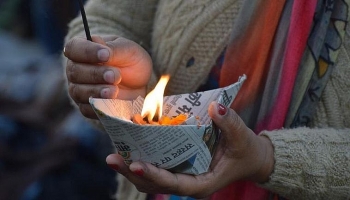 2021 Amavasya Days: New Moon Dates, Time, Rituals and Significance 2021 Amavasya Days: New Moon Dates, Time, Rituals and Significance Amavasya is new moon day in Hindu calendar. It is significant day as many rituals are performed only on Amavasya Tithi. Check 2021 Amavasya Days, ... |
 President Day - Washington's Birthday: History, Significance and Activities President Day - Washington's Birthday: History, Significance and Activities Presidents' Day born as a federal holiday taking place on the third Monday in February to honor the first president of the United States, George ... |
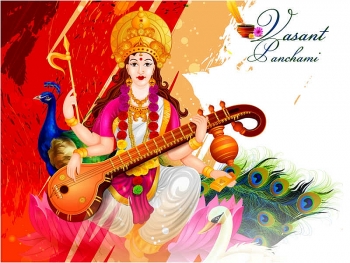 Basant Panchami 2021: History, Significance, Celebrations, Quotes, and Messages Basant Panchami 2021: History, Significance, Celebrations, Quotes, and Messages Basant Panchami is a significant festival in India which marks springtime harvest when flowers are in full bloom and every home can boast of color ... |


























